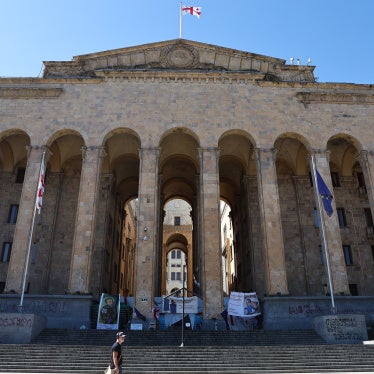While war rages in Chechnya's lowlands, up to 20,000 civilians in mountainous Shatoi district are trapped under constant bombardment from Russia forces. There are no safe exit routes for the civilians to flee.
"Russian forces have bombed Shatoi for weeks now, and the situation for civilians is desperate," said Holly Cartner, executive director of Human Rights Watch's Europe and Central Asia division. "The risk of more civilian casualties is enormous."
The populations of Shatoi, Itum-Kale, and surrounding areas has nearly doubled with displaced persons fleeing from other villages.
Exit routes for civilians are blocked in every direction. All zones and roads immediately north and northwest are currently under heavy attack by Russian forces as they close in on the capital, Grozny. High mountain roads leading south to Georgia have been made impassible by snow.
"Those in Shatoi district are basically up against a brick wall," "Abu," a thirty-nine-year-old former policeman from Shatoi, told Human Rights Watch. "If you leave, you're shot at, and the bridges are all knocked out."
According to "Abu," many of the houses in Shatoi do not have basements, making it difficult for civilians to shelter themselves from bombardments. "Abu" also told Human Rights Watch that on October 26 a bomb fell directly on the house of Aslan Ezheev in Nikhaloi, about seven or eight kilometers from Shatoi. Displaced persons were living in the house at the time. When the bomb fell, "Abu" and his brother were about 1.5 kilometers from the site, and they arrived on the scene about fifteen minutes later.
"It was horrible, it's very difficult for me to describe the scene," said "Abu." "The men were digging among the fragments and picking out pieces of flesh. We buried two children, wrapping pieces of their bodies in white cloth. There weren't big craters in the ground, but the whole house was blown apart." A total of six children were killed in the blast, including Ezheev's eleven-year-old son, and his wife.
"Saladuin," a sixty-year-old man witnessed a separate attack. He told Human Rights Watch how on November 21, planes and helicopters circled the village of Kakadoi, located around fifteen kilometers from Shatoi. When they flew away, people emerged from indoors. There was an explosion at 3:30 p.m. "Saladuin's" granddaughter Seide, aged six years, died from lung and heart wounds received during the explosion. Two of "Saladuin's" distant relatives were also killed, two of their children were struck in the head by shells, and several other people were killed. On November 14 or 15, a bomb fell directly in front of the house of another of "Saladuin's" relatives, leaving a crater 1.5 meters deep and 2.5 meters in diameter. The roof of the house was immediately destroyed, all of the windows were blown out, and the steel gates leading to the house flew fifteen meters into the street.
"Saladuin" told Human Rights Watch that during the second half of November the bombing of Itum-Kale and Kakadoi was constant. When he left Itum-Kale on November 22, food was in short supply, and that which remained had reached extravagant prices. "Saladuin" and others told Human Rights Watch that they traveled out of the Shatoi district by night to avoid aerial attacks, and confirmed that bridges along the way had been destroyed.
Human Rights Watch has previously reported on civilians casualties from Russian air strikes in the Shatoi district. See release "Russian Forces Fire on Fleeing Civilians," November 18, 1999.
Human Rights Watch calls on the Russian government to immediately implement a cease-fire along routes leading out of Shatoi region to enable civilians to reach safety.







